
Education remains top priority as Governor Lee unveils his 2020 legislative vision in State of the State
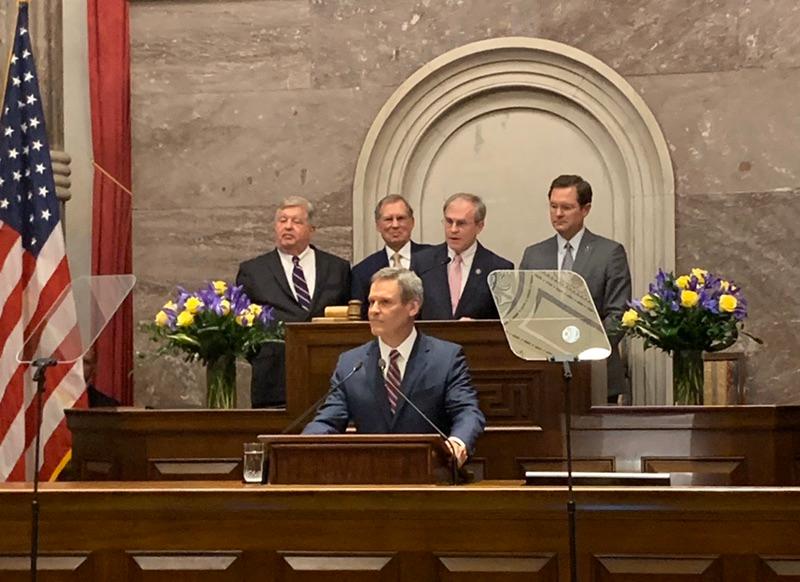
This week’s action on Capitol Hill was highlighted by Governor Bill Lee’s second State of the State Address on Monday evening where he presented his budget for the upcoming fiscal year and outlined his 2020 legislative vision for Tennessee. Improving K-12 education emerged as the top item from the night, as Governor Lee proposed a record $600 million in new funds for a series of initiatives to help students learn and reach their maximum potential.
Governor Lee also reiterated his commitment to workforce development, emphasizing that the proposed education initiatives are designed to boost economic development and ensure students are equipped for the workforce. To aid in this effort, proposals were introduced stressing the importance of teacher compensation, preparation, recruiting and retention.
“Make no mistake: we will do whatever it takes to make Tennessee the best state in America to be a student, and that means making Tennessee the best state in America to be a teacher. That means better pay, as we’ve said, but it also means better training and professional support, so that our teachers can perform at the top of their trade,” said Lee.
Key education priorities in the governor’s budget include the largest investment in K-12 teacher salaries in Tennessee history and the creation of a $250 million K-12 Mental Health Trust Fund. This innovative fund would support the growth and placement of mental health support services in Tennessee’s most at risk schools to ensure students’ basic needs are being met and that they are ready to learn at their highest opportunity level. Governor Lee also pointed to the need to address rising youth suicide rates in the state.
The $250 million would be a one-time allocation of funds managed by the Tennessee Treasurer’s office to yield positive returns and serve mental health needs of students for decades to come.
Another education challenge tackled by Governor Lee is improving early childhood literacy. Currently, only one-third of Tennessee third graders are reading on grade level. Lee announced legislation to establish new, clearer, evidence-based standards for teacher training, such as phonics-based instruction. He is also proposing an investment of $70 million to ensure teachers have the resources needed to improve literacy rates.
Other key initiatives for education include:
● Raising the minimum teacher salary schedule from $36,000 to $40,000 over the next two years;
● Growing school-based behavioral health liaison program from 36 counties to all 95 counties;
● Launching the Governor’s Teaching Fellowship to support the education of over 1,000 future teachers per year;
● Supporting district-led “Grow Your Own” programs with new curriculum and grants;
● Investing $4 million into professional development and career advancement opportunities for teachers and school leaders;
● Applying for a new AP education teaching course; and
● Establishing the Tennessee Teacher and Leader Institute which will solicit proposals from across the country to help launch a new initiative to build the best educator preparation program in the nation.
Budget proposal continues focus on increasing jobs, rural economic development – In his 2020 State of the State Address, Governor Bill Lee continued a strong emphasis on job creation, including the growth of economic development in Tennessee’s rural communities.
Key economic and workforce development proposals include:
· Cutting the professional privilege tax by 50 percent;
· Offering an enhanced incentive package for companies considering locating in Tennessee’s 15 distressed counties and 24 at-risk counties;
· Launching ApprenticeshipTN, a new effort that will realign the state’s approach to getting individuals back into the workforce;
· Increasing broadband accessibility through an additional $25 million investment, adding to the significant investments phased in over the past four years;
· Expanding the TN Agriculture Enhancement Program through a $7 million investment
· Investing $2 million for UT Extension Agents in distressed rural counties
· Investing $20 million in the Rural Opportunity Fund which supports site development, main-street development, and critical infrastructure assistance
· Supporting the Department of Tourism’s Office of Rural Tourism through a nearly $2.4 million investment
Watch the video from the State of the State here!
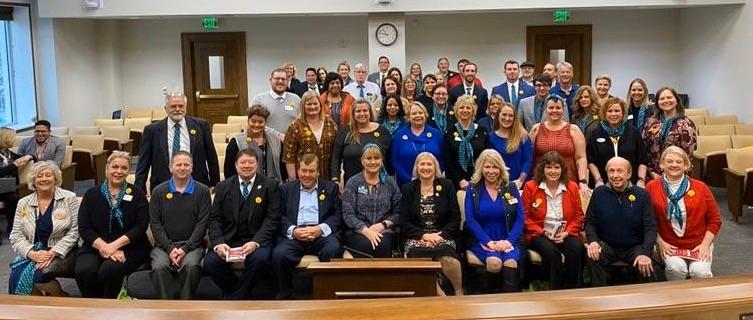
I had a great visit with Knoxville and East Tennessee area realtors on their Day on the Hill Senate Health and Welfare Committee advances compact legislation aiding efforts to help U.S. Armed Forces members and their spouses to practice their occupation when stationed in Tennessee
The Senate Health and Welfare Committee approved legislation this week aiding efforts to help U.S. Armed Forces service members and their spouses practice their occupation when stationed in Tennessee. Senate Bill 1142 calls for Tennessee to join the Interjurisdictional Compact for Psychology (PSYPACT) to give service members in the profession the privilege to practice in compact states using improved endorsement methods, a common understanding of standards, and shared responsibility to oversee occupational practice.
Similar legislation has already been adopted in Tennessee to expedite licensure for service members through the Emergency Medical Services (REPLICA) Compact, the Enhanced Nurse Licensure Compact (ENLC), and the Physical Therapy Licensure Compact (PTLC).
Obtaining licenses in order to secure employment is very important to military families who move from state to state in service to their country. These compacts serve to relieve one of the many stressors of a military move by expediting the process to transfer their license to Tennessee for the profession they are currently licensed to practice out-of-state.
The legislation also offers the opportunity for tele-practice opportunities using technology to work across state boundaries. Eleven states have passed the PSYPACT language, with four more states considering the proposal.
The Department of Defense, who recommended the bill, projects that at least 25 states will be engaged in the compact by the end of 2020.

It was an honor to speak at the Disability Day on the Hill. What an awesome turnout of my true heroes
In other news…
Tennessee tops nation in fiscal management and industry growth — On Monday night, Governor Lee touted Tennessee’s fiscal management and economic development success in his State of the State / Budget Address. In 2019, Tennessee was named the “number one best fiscally managed state” in the country for the first time. The state also led the nation in best business climate, advanced industry job growth, and small business growth.
The state has garnered 108 project commitments to create 16,500 jobs and $3.6 billion of capital investment in Tennessee. More than half of these projects have been announced in rural counties.
Senate Judiciary Committee hears recommendations for Judicial Redistricting – The Senate Judiciary committee heard five recommendations for a judicial redistricting plan made by the Judicial Redistricting Taskforce. The Task Force was charged with proposing a statewide redistricting plan that provides reasonable and timely access to Tennessee’s circuit, chancery and criminal courts.
Almost all legal matters, including divorce actions, contract disputes, boundary line disputes, and criminal cases, are initiated in the state’s trial courts. These courts, which are the most important and complex element of the state’s judicial system, have not been redistricted for 38 years.
The recommendations include three new judgeships – one each in the 19th, 22nd, and 23rd Judicial Districts. It also recommended that Hickman, Lewis and Perry Counties be separated from Williamson County and form the 32nd Judicial District. The Task Force recommends that funding for new assistant district attorneys general and Assistant District Public Defenders positions be allocated based on a weighted case load study, along with other relevant factors such as expected population growth.
Gov. Lee outlines criminal justice reform proposal to improve safety — Governor Bill Lee announced plans for criminal justice reforms on Monday night during his State of the State / Budget Address. The reforms aim to increase public safety by fostering a smooth reentry into society for the 95 percent of inmates who will return back into the community when their sentence is complete or upon being paroled. “When properly implemented, criminal justice reforms save taxpayer dollars, shrink the size of government, properly punish wrongdoers, and make our communities safer,” said Lee.
He unveiled three specific proposals to improve Tennessee’s criminal justice system through evidence-based best practices recommended by the Criminal Justice Investment Task Force. In continuation of a focus on mental health, Governor Lee first expressed plans to expand recovery courts so those struggling with addiction or mental health challenges can receive specialized treatment. Additionally, he announced proposals to improve community supervision for offenders at the end of their sentence, and revise the occupational licensing process so it will encourage employers to hire formerly incarcerated individuals.
Legislation updates and clarifies property tax appeals process – The Senate State and Local Government Committee approved legislation on Tuesday to make government work better for taxpayers by updating and clarifying the property tax appeals process. Senate Bill 1625 standardizes appeals to the State Board of Equalization. It expands to all counties the option to appeal commercial and industrial property valuations directly to the State Board with the consent of the local assessor. The legislation defines key terms related to tax payments on properties that are being appealed to reduce confusion and unnecessary expenses that could occur for both the taxpayer and the county. The bill also clarifies that once an initial order has been filed by a judge an appeal can no longer be withdrawn.
Lawmakers wear red to bring awareness to heart disease — State senators donned red clothing during Thursday’s floor session to increase women’s heart health awareness and in recognition of the American Heart Association’s annual “Wear Red Day.” The action coincides with a resolution applauding the association’s efforts to save lives.
Ninety percent of women have one or more risk factors for developing heart disease or stroke, yet only one in five American women believe that heart disease is her greatest health threat. An estimated 44 million women in the U.S. are affected by cardiovascular diseases. For more information about the signs, symptoms and risks, contact the American Heart Association’s Go Red for Women.
Legislation allows IEP students reasonable accommodations for state testing—The Senate Education Committee approved legislation this week allowing reasonable accommodations for students with an individual Education Plan (IEP). SB 1637 permits a student whose IEP provides testing accommodations to use the same accommodations when taking an assessment under the Tennessee Comprehensive Assessment Program (TCAP) or an end-of-course examination, unless it undermines the relevant portion of the exam. The bill now moves to the Senate floor for final consideration.
New initiatives increase health care access for Tennesseans – The 2020-2021 budget proposes several new initiatives to help rural hospitals and clinics, and provide health care services to uninsured Tennesseans. This includes investing an additional $6.5 million in recurring funds to the Health Care Safety Net and $7.5 million to create a Children’s Behavioral Health Safety Net. He also called for extending postpartum coverage for women on TennCare to 12 months and ensuring all pregnant women on TennCare receive dental benefits. These new funds are in addition to providing $4 million for payment increases to rural health clinics and expansion of dental care through the Department of Health’s new public-private partnership with SmileTN.
Governor Lee asked the legislature to fund the third year of the Rural Hospital Transformation Program which helps struggling hospitals find innovative ways to overcome economic challenges so they can continue needed care to rural communities.
The Governor appointed a Health Care Modernization Task Force which is working on ways to lower costs, increase access, and improve quality, with recommendations expected next year.
Senate Energy, Agriculture and Natural Resources Committee hears report on the health of Tennessee Forests — The Senate Energy, Agriculture and Natural Resources Committee heard testimony this week from Tennessee Forestry Commission Chairman Johnny Heard and State Forester David Arnold about the health of Tennessee’s forests and what the commission is doing to address important long-term issues. The commission addresses many challenges facing Tennessee’s forests such as new pests, invasive species, forest quality, wildfires, and protection of soil and water quality.
Tennessee has approximately 14 million acres of forests which are important in providing beautiful landscapes, wood products, clean water and abundant wildlife habitat. In addition, forestry employs over 180,000 people directly or indirectly greatly impacting the state’s economy.
Fire protection is a main concern for forest preservation with fire suppression being one of the main reasons the division of Forestry was created over 100 years ago. Last year, the Division of Forestry responded to 302 wildfires totaling 3,485 acres, which marks the lowest on record. These low numbers were aided by a wet year and robust fire safety education and outreach campaigns. Division firefighters also saved 208 structures and 55 vehicles from being destroyed worth a combined estimate of $13 million.
Commission officials told lawmakers that while 2019 was a good year, the threat of forest fires in Tennessee remains a top priority. In 2016, Tennessee experienced one of the deadliest and most damaging years in the state’s history. This included wildfires in the Great Smoky Mountains which were fueled by dry conditions and high winds. Arnold told the committee that there is an increasing demand for prescribed fire services to ensure forest management objectives are met, while minimizing the potential for escaped fires. Retention and recruitment of qualified firefighting personnel are key concerns to aid in this effort.
Another challenge for the forestry officials is the risks from native and non-native forest pests, from an aging forest, and from an urbanizing human population. State forestry officials have been working aggressively to eradicate the ever-increasing number of native and non-native pests encroaching on Tennessee’s forests. These include the gypsy moth, hemlock woolly adelgid (HWA), southern pine beetle and invasive plants. Over 17,153 trees were treated for HWA last year.
Full Senate acts to officially recognize Volunteer State nickname — The full Senate acted on Monday night to embed into state law the nickname Tennessee has enjoyed since 1812 as the “Volunteer State.” Senate Bill 1552, which I am the sponsor, honors the state’s heritage and inspires future generations to answer the call to service. The Volunteer State moniker dates back to the War of 1812 because of the prominent role played by volunteer soldiers from Tennessee. It also refers to the state’s response to President Polk’s call for 2,600 volunteers at the beginning of the Mexican-American War, which resulted in 30,000 volunteering from Tennessee alone. The bill is pending final action on the floor of the House of Representatives.
Honoring the memory of Senator Sue Atchley — The Senate stood to honor the memory of Senator Sue Atchley on Monday while voting unanimously to approve Senate Joint Resolution 757 heralding her service to Tennessee. Atchley, a Republican who served in the Tennessee Senate during the 107th General Assembly, was appointed by the Knox County Commission to fill the term of former Senator Jamie Woodson until I was elected in November 2011. She served in the seat once held by her husband, former Senate Republican Leader Ben Atchley.
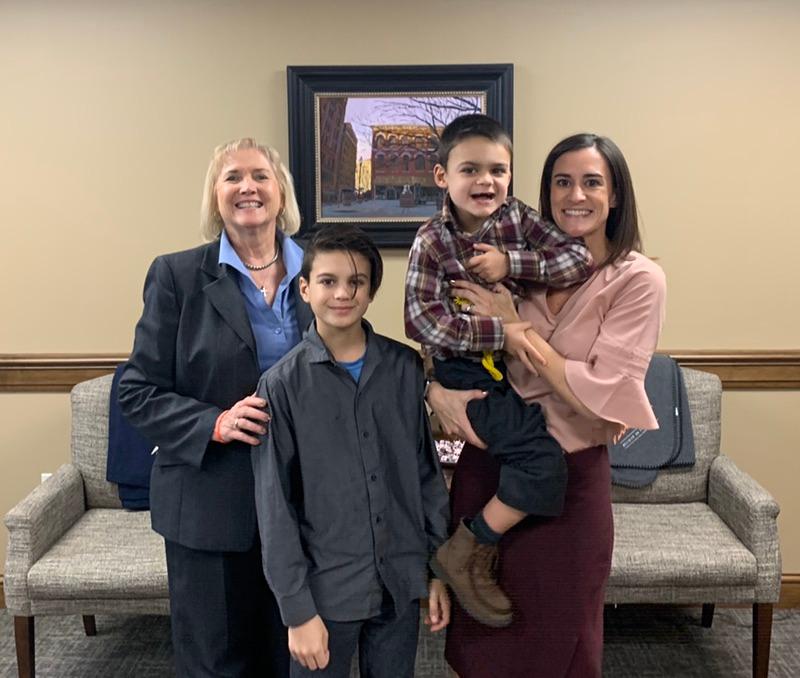
Sandy Bush and her family stopped by for a visit on Disability Day on the Hill.

Tatum Fowler also visited with me on Disability Day on the Hill

Lou Moran and Dick Williams with the Insurors of Tennessee and I visited with Commissioner Hodgen Mainda-Department of Commerce & Insurance
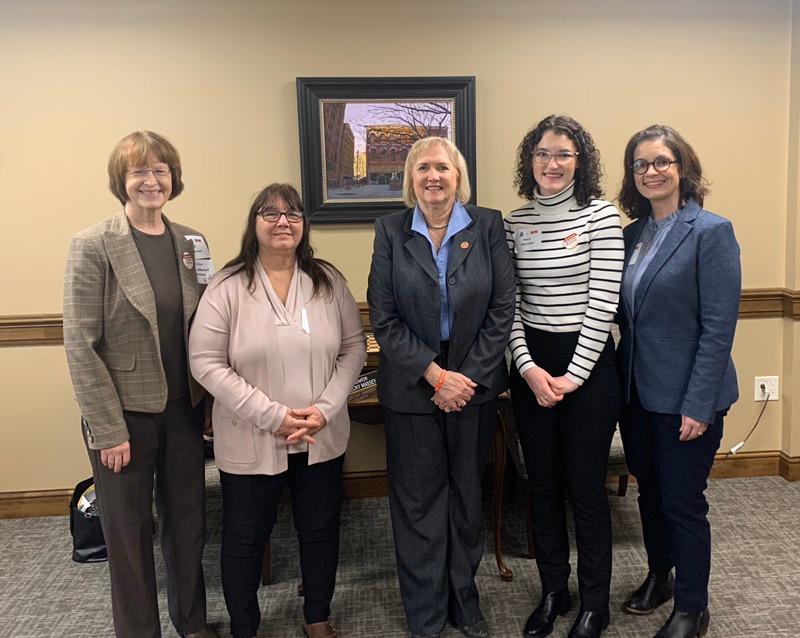
I appreciate the dedication of our nurses and always look forward to the Nurses Day on the Hill
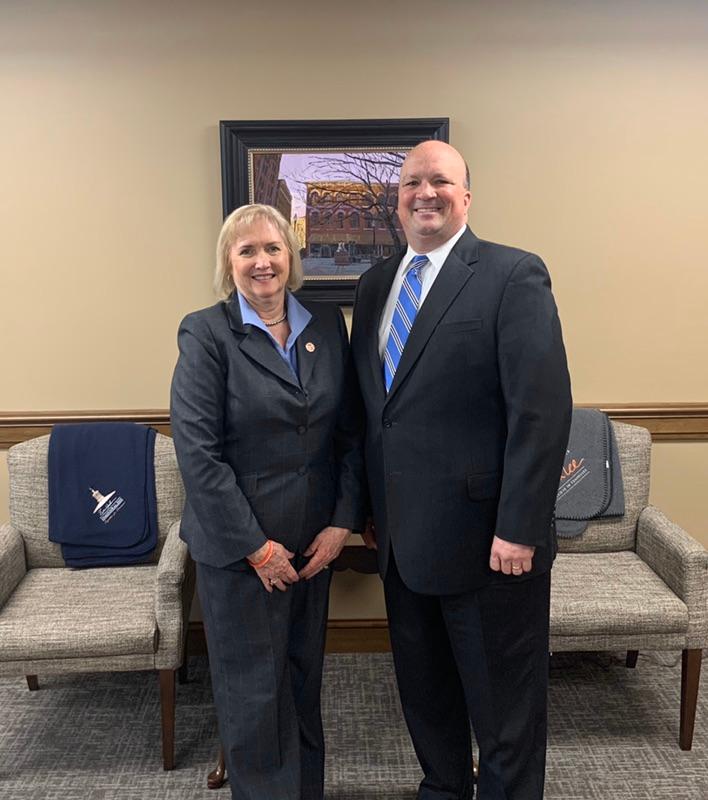
Brad Anders, Executive Director at Knox County Emergency Communications District (911), stopped by to discuss upcoming legislation
For information on State Senators including phone numbers and email addresses, click Tennessee State Senators.
For House members, click Tennessee House Members
For all other information on the General Assembly including legislation, schedules and videos, click Tennessee General Assembly
As always thank you for continued support!
Sincerely,
Becky Massey
District 6 Senator
615-741-1648.
